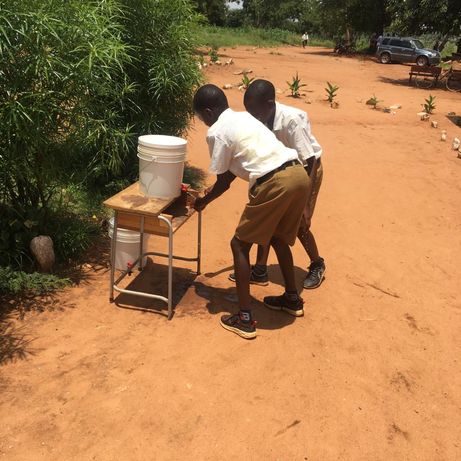From the Boston Professional Chapter of Engineers Without Borders: Life During the Pandemic 2020, 2021 and 2022
By Barbara Piper, Program Manager for Tanzania, Engineers Without Borders Boston Professional Chapter
The emergence of the novel coronavirus (SARS-CoV-2) this past year has turned life upside down for the world as we know it. This statement has unfortunately become a cliché we would have never expected. We have been encouraged to take precautions to limit the spread of this virus by staying home and practicing good sanitary habits. We have learned the most effective way to eliminate germs by handwashing and wearing masks so that we do not infect ourselves or others. We are working from home and are “socially distancing”. However, we are social beings and having the ability to connect with others virtually has helped to lessen the pain of not being able to be with each other in person.
Those of us who are members of the Boston Professional Chapter of Engineers Without Borders (EWB-USA) have continued to meet and socialize, using platforms such as Zoom, Teams, and Slack, to name a few. We have had virtual trivia nights, a cocktail-making workshop, and started a series of mini-conferences for other EWB chapters working on similar projects. We have also been fortunate that we have been working for several years with communities in central Tanzania and have been used to communicating via WhatsApp and email. And so we continued with our project plans although the timeline for when the pandemic might be brought under control was uncertain. We are at varying stages of completion of projects in water supply and sanitation and delaying these was never an option at a time when the need for clean water is only heightened.

Photo from EWB-USA
Our dedicated members have continued to volunteer countless hours designing new water supply systems, reaching out to many people to raise funds, and coordinating with our partners in Tanzania to ensure we could successfully implement our projects remotely. After meeting only once the prior year with village leaders and residents in Chamhawi, in the central Dodoma region we were able to drill a 130-meter borehole well for this community of 600 people. And, to ensure sustainability of the borehole and handpump, we were able to facilitate an excellent training program for the creation of a strong community-based water supply organization with the help of our in-country trusted partner, Semu Nassari. The community is now enjoying a plentiful supply of clean water for the first time. We are hopeful that this aids in minimizing the transmission of disease and will contribute to improved public health.
Because it is still not known when it will be safe for us to travel across the globe, we are in the midst of finalizing plans to implement building a pipeline to transport potable water from a borehole well we drilled previously in the village of Mkutani, which is also in the central Dodoma region of Tanzania. Construction will begin in May 2021. This portion of the project will also be conducted remotely as it is particularly important that this source of clean water can be readily available in the village instead of needing to walk four kilometers each way. Additionally, we are making plans to build in the end of the summer of 2021 a new block of latrines for the girls attending the village primary school in Mkutani as schools have reopened there and this need is still great.
As the days, weeks and months go on, we here in the United States are beginning to see progress in our fight against this virulent disease. And we are feeling that perhaps life will return to “normal” again sometime soon. Unfortunately, we know this is not the situation everywhere in the world. It will be long into 2022 before the pandemic will end in places such as Africa. And thus, we will continue our efforts to bring clean water and sanitation to our partner villages in rural Tanzania and look forward to being able to be with them again in person. And although we have been physically distant, we have not been socially distant as we continue to share our lives with photographs, videos, and news of births, deaths and engagements. And on this great planet, life, and living life, continues.